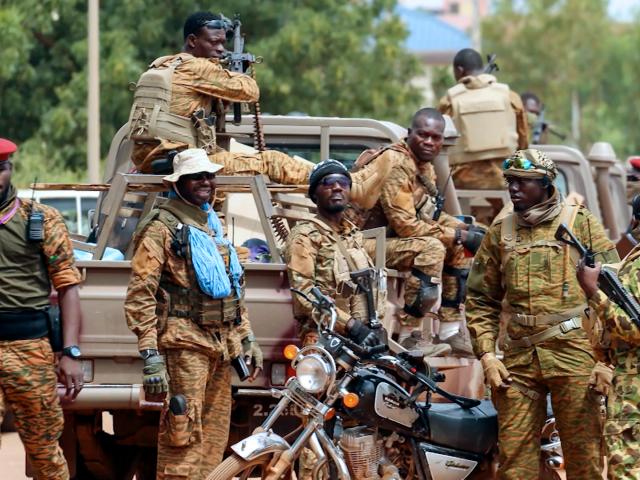EASTERN CHAD—A vast and unforgiving part of Africa known as the Sahel is becoming a powder keg.
Terrorists are turning this region scarred by poverty, conflict, and despair into a battleground. Islamic extremist groups like ISIS, Al Qaeda, and Boko Haram could soon cause this fragile landscape to collapse.
The Sahel stretches east to west across portions of 10 African countries, including Mali, Burkina Faso, Niger, and Chad. “It spans thousands of miles and is very remote,” Bill Roggio with the Long War Journal described to CBN News.
Here, the sun beats down relentlessly, the air dry and stifling. People live in the shadow of the Sahara and struggle to survive.
“Life in the region is very harsh,” said Rida Lyammouri, with the Morocco-based Policy Center for the New South.
The reality is brutal, with 80 percent of the population living on less than two dollars a day. It’s a place where survival often feels like a constant battle.
The governments across the Sahel are weak, torn apart by political instability and corruption. And into this void have stepped Islamic extremists.
“The Sahel is the epicenter of global terrorism,” warned Steve Killelea with the Australia-based Institute for Economics and Peace.
***Please sign up for CBN Newsletters to ensure you keep receiving the latest updates from a distinctly Christian perspective.***
Killelea’s organization, which publishes the annual Global Terrorism Index, shows the Sahel has become the epicenter of global terrorism, surpassing even Afghanistan and Iraq.
“What we find is that the number of deaths there have increased 10 times since 2019,” Killelea told CBN News.
More than half of all terrorism-related deaths worldwide are occurring here. “There were 5,595 people killed through terrorism in 2024,” Killelea said.
The primary perpetrators are ISIS and Al-Qaeda. Roggio says these groups, despite being bitter rivals, share a common vision. “They want to establish a global caliphate and impose their harsh version of sharia, or Islamic law, on the people,” Roggio said.

Lyammouri warns ISIS and Al Qaeda are rapidly expanding their hold.
“When we talk about the Sahel and the conflict, we are referring mainly to three countries of Mali, Niger, Burkina Faso, but also we can include parts of Chad and Mauritania,” Lyammouri said.
The signs of this unraveling are clear: Since 2000, there have been six coups in the region.
“You have weak African governments; you’ve had multiple juntas that have overthrown established governments that have been friendly to both the United States and the French and it’s become a very dangerous area,” warned Roggio.
Here in Chad’s capital, N’Djamena, residents fear instability in neighboring nations could spill over its borders.
“This part of Africa is complex; we have war in Sudan, instability in Libya, Burkina Faso and Mali, a resident of N’Djamena shared with CBN News. “All these countries are in a state of chaos and that can definitely have an impact on Chad.”
While Christian humanitarian organizations, like World Vision, are trying to help, the situation remains dire.
In western Chad’s Lac Province, Boko Haram’s violent cross-border raids have left a trail of destruction by abducting women and children, and forcing thousands to flee their homes.
“It’s a triangle of three countries: Chad, Niger, and Nigeria. Because of the militancy they drive people in different directions through their activities and so our humanitarian imperative drives us to go into these places because we know that most of the people affected by these crises are women and children,” said Edouard Ngoy, who heads World Vision’s Chad office.
In the last couple of years, the United States, along with the French, has helped the Chadian government come up with a strong anti-terrorism unit that has aggressively gone after ISIS, Al Qaeda, and Boko Haram elements operating within the country.
Still, the West, which once tried to stabilize the region, has been kicked out. The U.S. and France have been forced to withdraw from key bases in Chad and Niger, leaving behind a power vacuum that extremists are eager to fill.
“It’s a major blow,” said Lyammouri. “The U.S. spent hundreds of millions of dollars to build the air base in northern Niger and then suddenly they had to leave everything behind. Same thing, they have left Chad, they have left Mali, and they have left this void.”
That has given the terror groups more freedom.
“A country like Burkina Faso, half of it is considered to be under the control of Al Qaeda,” said Roggio. “Al Qaeda controls significant portions of Mali. The Islamic State also has significant presence in Mali and in Niger.”
Killelea adds the threats are not confined to just these countries. Togo, Benin, and Ivory Coast now face danger as well. And in February, Moroccan authorities arrested several individuals plotting attacks on behalf of ISIS.
As the West retreats, Russia is seeking influence, securing arms deals with Mali, Burkina Faso, and Niger. In early April, their foreign ministers visited Moscow, where Russia pledged to arm and train a 5,000-strong force.
“In return, what Russia gets is access to a lot of the natural resources within these countries, especially gold,” said Killelea.
That gives the Kremlin additional funds to continue its war against Ukraine.
“I would also add to that that the Russians are looking to deal a blow to U.S. and European influence within Africa as well,” added Roggio.
With Western powers withdrawing, Russia expanding its presence, and local governments faltering, the Sahel faces an uncertain future.
Experts warn that the growing Islamic threat will further destabilize the region.


















